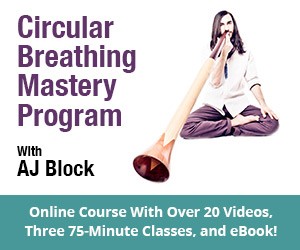We welcome and love new contributions from our growing community. Here’s what you need to know:
- Word count: No minimums but posts typically run between 250 and 800 words. Please stay under 800 words.
- Tone: Inclusive, accessible and generally positive. Take a look around and see what we’ve previously posted.
- Original Content: We ask that posts submitted be unique and original to Didge Project. We do not accept posts that have already been published or submitted elsewhere online (not even on your personal blog) or that you plan to distribute to other websites.
- We are not interested in SEO-driven submissions: If you work for a content farm or are writing articles for the sole purpose of linking up keywords in an effort to boost SEO or to plug a product or brand name in a post, we are not interested. If your submission or bio references or promotes a business or service that is not in line with our philosophy (e.g. a weight-loss gimmick), then we are not interested.
- Bio and promotion: Since we do not compensate contributors for posts, we’re more than happy to include a byline and your brief bio containing links to your website, Facebook, Pinterest, Instagram and Twitter accounts, which we will promote when your post goes live. Please keep your bio to just 2-3 sentences. Didge Project is a great resource to promote what you’re doing.
- Health claims: If you mention a statistic or a study in your piece, please include a link to that source. If you’re claiming that a certain practice is healthy, tell us how you know. Ideally you’d link to peer-reviewed scientific papers, academic journals, and/or credible news outlets. This way, readers can follow your line of thinking and investigate further if they want to know more.
- We love connecting with new contributors. While we cover an insane amount of ground, Didge Project consists of just a few people. As such, sometimes we don’t have the opportunity to respond to all submissions. We can assure you, however, that we carefully read every single submission that we receive. If your post has been accepted, we will respond within 14 days. If your post has not run within two weeks of submission, we have decided not to publish it.
- Please only submit one post at a time: You’re welcome to submit again with a different post after you’ve waited 14 days.
- By submitting to Didge Project you acknowledge that you accept our terms, and any form of editing that might occur on behalf of the Didge Project editorial team.
- Continue reading below to find out more about our submission process, including contact information for submissions.
WHAT WE LOOK FOR IN SUBMISSIONS
- We love posts that help our readers grow and feel inspired. While there aren’t strict guidelines about the type of posts we feature, we find that tutorials, inspirational pieces, and personal essays about transformation through music are successful. Inspirational pieces typically provide tips to improve musicianship, health and happiness. Pieces with specific music exercises or songs also resonate with our readers.
- Photos: All contributors are encouraged to submit photos with their posts. These should be at least 850 pixels wide by 400 pixels tall (bigger in either direction, or both, is fine). We love photos that are shot outdoors, in natural light, and ideally with as few distractions in the background as possible.
- Didge Project photo guidelines: In an effort to keep our photos consistent in style, please keep in mind the following when submitting:
- Photos work best on our website in landscape format.
- We prefer photos taken in natural daylight.
- Neutral backgrounds work best.
- Please see these examples of the type of style we are looking for. Thanks!
WHY WRITE FOR DIDGE PROJECT?
Here are a few reasons why you should share your ideas at the world’s most popular online wellness destination.
- You’ll change lives.
Our community is passionate about music! They’re eager to learn how to bring music into their lives, share tips with friends and clients, and discuss ideas here on the site. Writing for Didge Project gives you a chance to be part of this discussion, and to shape the way health is perceived around the world.
- You’ll reach a global audience.
Once your piece has been accepted for publication, we’ll do our part to make sure it reaches as many people as possible. In addition to posting your work on our home page, which gets thousands of visits each month, we share most posts on Facebook and Twitter. Published pieces will also live in our library of wellness content.
- You’ll achieve your professional dreams.
Our writers have gotten opportunities to perform and teach all over the world. They’ve also attracted more clients, booked teaching jobs, and grown their brands, simply by writing great posts that got people interested in what they had to say.
- You’ll work with top-notch editors.
Our team of professional editors will work with you on your piece and give it a title to help it get seen by the largest audience possible. They’ll also choose high-quality photos to make your work look great!
- You’ll set your own schedule.
You can contribute a post when you like. Which means: no deadlines, except the ones you create for yourself!
5 QUESTIONS TO ASK YOURSELF BEFORE SUBMITTING TO DIDGE PROJECT
- Is my piece inspiring, informative, and/or educational?
Posts featured on Didge Project are positive and informative. If your piece is sarcastic, pessimistic or not about music, it’s probably not for us. If you’d like to write about wellness, holistic therapies, or healing, please make it relevant to the music community.
- Has this already been covered on Didge Project?
We feature a wide range of topics on Didge Project and we have a large library of great content. How can your piece add to what’s already there? Perhaps your submission can elaborate on one aspect that didn’t get a lot of attention!
- What’s a great title?
Remember: our readers are busy. A good title has the potential to grab their attention and make them want to read your piece. If you’re stuck trying to create one, ask yourself: What problem does my article solve? How will reading this article make someone’s life better? How would I explain this to a friend?
- Is my first paragraph succinct?
You only get one chance to make a first impression! Does your introductory sentence make the reader want to continue? Does your first paragraph tell the reader very clearly and succinctly what the article will be about?
- Am I offering actionable tips?
Many readers come to Didge Project to find a musical solution to wherever they are stuck. A great piece will provide tips that they can implement easily. Here’s an example of a tip that’s actionable: Turn on your metronome to 80 beats per minute and pat your hands on your legs, one pat on each click, in the sequence: Left right left left Right left right right... Notice how clear and precise that is? The reader knows exactly what to do. Here’s an example of a murkier tip: Clear your mind. Yes, we’d all like to do that, but how?
7 TIPS TO WRITE A GREAT POST
Here are few pointers to keep in mind when writing for Didge Project.
- Write in the first person using your own voice.
A great post will sound like a real person wrote it, and it will have a distinctive voice. If you’re not sure what “voice” means in this context, think about it this way: how would you explain your idea to a good friend? Use that conversational tone when you write!
- Keep it short.
These don’t need to be long posts! Just 700 words is great! If you’re going to offer tips, include a short introductory paragraph at the top of your post explaining why you’re offering this advice. Are you an expert on the topic? Did you struggle to understand the issue and want to share your knowledge?
- Delete needless words.
Sometimes people use several words when just one will do the trick. We recommend taking one look at your piece to make sure you’re only including words that are absolutely necessary.
- Use an authoritative voice.
It’s understood that Didge Project posts are the opinion of the author. As the writer, you’re the expert on your own opinion! For this reason, you don’t need to use phrases like, “in my opinion,” or “I believe,” which detract from the idea you’re trying to convey.
- Stick to plain English!
Many people who visit Didge Project are new to playing music, so we prefer to use plain English when describing musical terms. For example, if you’re writing about rhythm, we like to break it down this way: 1, 2, 3 and 4 and…
- If it’s a unique instrument, include an amazing photo.
Remember: people love eye candy, and a photo of an exotic instrument can get people excited to read your article. While our editors can usually provide stock images for pieces, they can’t always do it as good as you can. Include a professional-quality photo of your instrument for the best effect.
- Show us your sources.
If you mention a statistic or a study in your piece, please include a link to that source. If you’re claiming that a certain food is healthy, tell us how you know. Ideally you’d link to peer-reviewed scientific papers, academic journals, and/or credible news outlets. This way, readers can follow your line of thinking and investigate further if they want to know more.
5 TIPS TO WRITE A GREAT PERSONAL ESSAY
We love personal stories about how music changes lives, and we’re always on the lookout for great ones. Really great essays share these qualities:
- Stay focused.
Keep the spotlight on one time in your life. If you’re writing about your high school jazz band, don’t mention all every other band you played in here in this essay; stick to one important time in one band. And keep it on the shorter side. Didge Project essays are about 800 words long.
- Include a perspective shift.
Great essays illuminate how you’ve changed in one area of your life. Usually this requires some growth in how you view the world, so let us see that transformation! If you begin at Point A, your essay should wind up at Point B.
- Don’t leave us wondering about your motivations.
Your choices are what make you interesting, so let us into your thought process.
- Be really specific.
It’s ironic, but the more specific you are about your life, the more your story will resonate with others. For example, it’s stronger to say “the first band I ever played in, taught by Mr. James Howard at Balboa High School” than “a class.”
- Be personal.
The more honest and vulnerable you can be about your struggles and victories, the more readers will be inspired by and empathetic to your story!
Please email us the following if you’re ready to submit:
- Your full post with a working title. Please send this within the body of an email.
- Any relevant images for your post. (Please send as separate files, not pasted within a doc). Please only send images that you own.
- Your brief bio (less than 120 words) with links to your website, Facebook, Pinterest, Instagram and Twitter pages. Please put any relevant links in brackets like this both in your bio, and in the piece: [http://facebook.com/didgeproject].
- Please DO NOT hyperlink ever.
- A headshot or photo of you to use for your bio.
Please send all of the above to info@didgeproject.com









